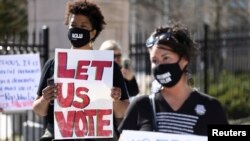A coalition of civil rights groups has filed a federal lawsuit challenging Georgia's sweeping new voting restrictions, arguing that the Republican-backed law is intended to make it harder for people – particularly Black voters – to cast ballots.
Meanwhile, President Joe Biden, who became the first Democratic presidential candidate in three decades to win Georgia in November's election, accused Republicans there and in other states of mounting a broad assault on voting rights.
Among other limits, the law imposes stricter identification requirements, limits drop boxes, gives lawmakers the power to take over local elections and shortens the early voting period for all runoff elections. It also makes it a misdemeanor for people to offer food and water to voters waiting in line.
The legislation has alarmed Democrats, who just months ago celebrated historic wins in the presidential election and two Senate campaigns in Georgia that helped deliver the White House and control of the U.S. Senate to their party in Washington.
"It's an atrocity," Biden told reporters Friday, shortly after comparing the restrictions to racist laws that for decades kept Blacks from full voting rights.
He has urged Congress to pass Democratic-backed legislation that would require automatic registration, expand absentee voting and temper voter ID laws. Thus far, Republican opposition in the divided U.S. Senate has stymied that effort.
Lawsuit: 'Discriminatory effects on voting'
The Georgia lawsuit was filed in Atlanta federal court hours after the legislation became law Thursday by the New Georgia Project, Black Voters Matter Fund and Rise Inc. Marc Elias, a Democratic lawyer who spearheaded the party's election legal efforts last year, is representing the groups.
"These provisions lack any justification for their burdensome and discriminatory effects on voting," the lawsuit said.
"Instead, they represent a hodgepodge of unnecessary restrictions that target almost every aspect of the voting process but serve no legitimate purpose or compelling state interest other than to make absentee, early and election-day voting more difficult — especially for minority voters."
Biden said that restrictions were "outrageous" and "un-American."
"We have a moral and constitutional obligation to act," he said, possibly foreshadowing a coming legal fight over the measure.
Republican response
Other Republican-controlled state legislatures are pursuing voting restrictions in key battleground states, including Florida and Arizona, after former President Donald Trump repeatedly blamed his loss to Biden on massive voter fraud without evidence.
Republicans have defended the legislation as necessary to make "our elections fair and secure," as Georgia Governor Brian Kemp put it when signing the bill into law Thursday.
Democrats and voting rights advocates decried the restrictions, which passed the legislature solely with Republican support, as a revival of racially discriminatory voting laws that will harm voters in minority communities, which are already plagued by long lines and inadequate election infrastructure.
As he contested his national loss to Biden, Trump focused much of his energy in Georgia. At one point, he personally called the state's Republican secretary of state, Brad Raffensperger, and urged him to "find" votes Trump claimed had gone missing.
That phone call is part of a criminal investigation by state prosecutors into whether Trump broke election laws by pressuring officials to alter the results.
Trump's assertions about voter fraud have reinforced long-standing Republican warnings that stricter laws are needed, despite research showing that such cases are vanishingly rare.
In a Reuters/Ipsos poll in February, 62% of Republicans said they were "very concerned" that elections were tainted by ineligible people casting votes. Weeks before the election in October, 47% of Republicans expressed the same level of concern.








